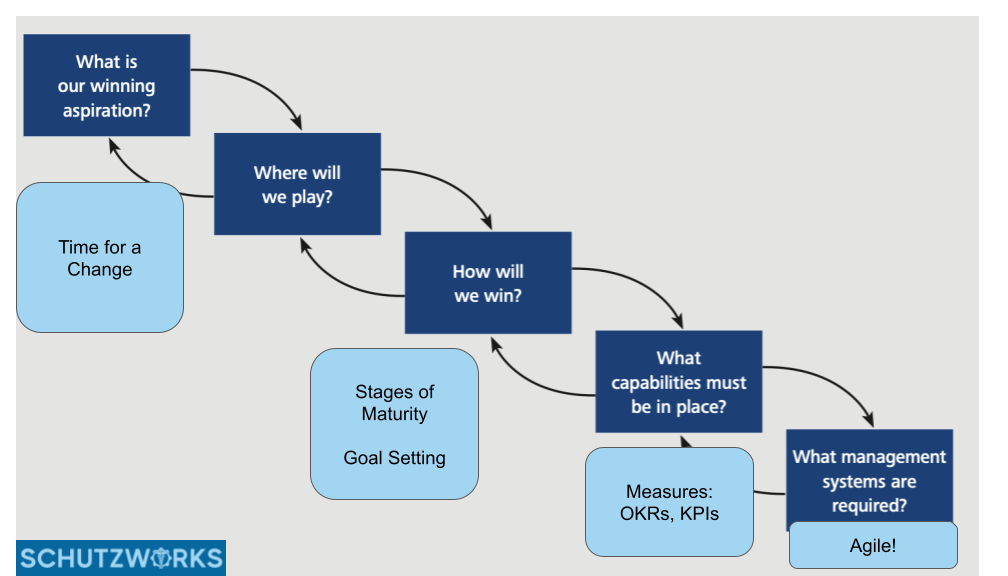Let’s pick back up with Strategic Preparation, the Schutzworks approach to aligning organizations to solve complex problems together, repeatedly over time.
We last discussed organizational capabilities required for success within your chosen strategy: qualitative descriptions of activity (what you do) paired with a quantitative performance level measure (how well you do it). Capabilities take the same format as goals/OKRs, which is pretty convenient if you are in company planning mode. Consistent performance with continuous improvement within these chosen capabilities requires management systems – rigorous, repeatable approaches to guarantee performance while adapting to change.
On rereading the Playing to Win chapter on management systems, it turns out to be the weakest chapter in the book. The underlying challenge they face(d) is that management systems should be specific to each organization’s capabilities. As such, they offer three general types of management systems:
Systems for making, reviewing & communicating strategy (duh)
Systems to support core capabilities
Systems for measurement to ensure performance
These are all helpful, but let’s add a fourth general management system, one that seems to be hidden but ubiquitous as a byproduct of managing the chaos in all organizations: A system for managing changes in work. Managing what change work ought to happen when, turns out to be a sort of 10th-dimensional-sphere-in-a-box problem–where its complexity can exceed that of the problem all the work is trying to solve. We will have plenty of future posts detailing an approach to managing changes, I promise.
For now, we’ll focus on an attempt at a general form of a management system because when taken together, these four management systems comprise a strategy-led view of how an entire company works, but manages to cram the entire company’s operations into one management system type. It is technically exhaustive, but perhaps at an unhelpful level of specificity.
So how does one proceed? While your strategy helps you prepare for the future, the purpose of any management system is to give intelligence about the present. It provides answers to the question, “Is what is supposed to happen, happening?” Inherent then, are three parts:
A subjunctive statement of expectation: “What is supposed to happen?” and ideally this is the capability statement and measure.
A monitor of current performance: The “happening” part. This can be visual, manual, active, passive, a blinking light, a dashboard, a speedometer, whatever is the right pattern for the activity measured.
Lastly, a trigger for diagnostic and therapeutic wisdom: if it ain’t working, which part is broken and how do we fix it?
Safety, reliability, assurance, uptime, predictability – these are all the goals of a management system and the words differ by industry, but are basically all the same. Management systems include and are indistinct from the people working within them. Ignore the technocratic obsession with people-free or people-agnostic systems, they are impractical at best. For further convincing, read this incredibly awesome, but dense treatise called How Complex Systems Fail by Dr. Richard Cook. It is a challenge, take your time. Treat each paragraph as a book chapter and pace appropriately.
If you design your management systems with these components in mind, they will enable you to perform maintenance to prevent failure, remedy failure when it does happen, and continuously improve your operations, all required to combat entropy. This idea, that improving daily work is more important than doing daily work, is one of the core principles underlying DevOps, while designed for software development, turns out to have amazing applications within complex service delivery like healthcare. More on that, later.
So, as senior leaders, inevitably removed from the daily work of your company, if you would like to steer your organization to a bright future, obsess instead with the present. Build management systems that show you what is currently happening. Because after all, isn’t the future just an extension of your current course and speed, with your trajectory radically altered by black swans? With these principles in mind, you can round out strategic preparation, focus on the present and get everyone focused on the right work.



